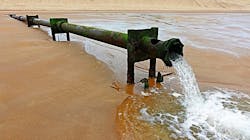Sewer Pipe Collapse in Rhode Island
In Warwick, R.I., it could take weeks to repair a collapsed sewer pipe that forced sewage into homes over the holiday weekend as well as detoured several school bus routes.
According to WPRI-TV, the westbound lane on Sandy Lane is back open after the entire street shut down after a sinkhole opened. On Nov. 26, the sinkhole was filled and the lane was reopened. However, the Eastbound lane remains closed.
Originally, the problem was a sewer pipe collapse that occurred on Nov. 21. The collapse forced sewage into at least 11 homes, according to Warwick Sewer Authority Executive Director Janine Burke-Wells.
“The timing couldn't have been worse,” Burke-Wells said to WPRI-TV. “We’re just really sorry.”
According to Burke-Wells, it could take weeks to replace the 50-year-old sewer pipe, buried 20 ft below Sandy Lane. Crews are using a bypass pump to make sure no more sewage enters any homes and that residents should be able to flush their toilets like normal.
Unfortunately, this was not the first instance of sewer pipe collapsing in this area. Another pipe broke several months ago. Burke-Wells said she attributes both to corrosion of the pipes caused by the hydrogen sulfide gas let off by sewage.
According to Burke-Wells, the city’s insurance company was paying for cleanup and repairs, and even put some families in hotels. There were also some school bus pickups that were cancelled leaving parents to find alternate routes to school.
Resident Jeremy Mitchell had to pick up his child who attends Lippitt Elementary from her temporary busy stop behind the Warwick Public Library.
“It’s just been a pain in the butt,” Mitchell said to WPRI-TV. “Just traveling back and forth to your house… it’s definitely inconvenient.”
According to WPRI-TV, when Sandy Lane was closed from Trent Avenue to Fletcher Street, some neighbors complained of traffic being detoured down their road.
Burke-Wells believes the solution is to repair and replace all the pipes in the city, which her team has been doing. However, they have not been able to get ahead of the corrosion in every case.
“We can’t seem to get a break,” Burke-Wells said to WPRI-TV.
